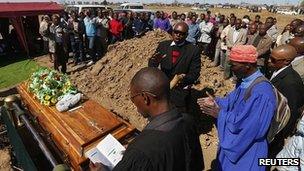South Africa's Zuma 'will not act' on Marikana charges
- Published

South Africa's president has refused to intervene in the case of striking miners charged with the murder of 34 others shot dead by police last month.
Lawyers for the 270 accused had written to Jacob Zuma demanding that the men be freed by 13:00 (11:00 GMT) on Sunday.
They were charged under a controversial apartheid-era law, accused of provoking police to fire on the crowd.
In a statement, Mr Zuma rejected the request, saying he would respect the institutions investigating the case.
The killing of the strikers at the Lonmin-owned mine shocked the nation.
State prosecutors have charged the miners under the "common purpose" doctrine, used by the white minority apartheid regime to crack down on its black opponents and at the time opposed by the now ruling African National Congress.
"The president is required to uphold the constitution at all times and he respects the independence of all institutions created to ensure the smooth functioning of our constitutional democracy, including those in the legal sphere," the statement on the presidential website said.
In their letter to Mr Zuma, the group of lawyers representing the 270 miners warned that they would apply to the high court to order the workers' release if their demand was not fulfilled.
Earlier, Justice Minister Jeff Radebe demanded that the National Prosecuting Authority (NPA) explain the charges, saying decision had "induced a sense of shock, panic and confusion" among South Africans.
The charges have been condemned by constitutional lawyers.
Meanwhile, funerals of the slain mineworkers, many of whom were from the Eastern Cape, are continuing.
Officials have fanned out across the country to attend the funerals in an attempt to distance themselves from the controversial charges, the BBC's Karen Allen reports from the Eastern Cape.
'Discredited'
Police said they opened fire on the strikers at Marikana after being threatened by a crowd of protesters who advanced towards them, armed with machetes.
The 270 miners, six of whom remain in hospital, were arrested during the protests.
They were charged on Thursday, with the prosecutors arguing they were part of the crowd whose actions provoked the police into opening fire.
South African lawyer Jay Surju told the BBC's Focus on Africa programme that the "common purpose" doctrine was "outdated and infamous".
"It was discredited during the time of apartheid."
No police officers have been charged over the deaths, because a judicial inquiry and an internal police review are under way, but these are expected to take several months to complete.
The strike turned violent before the police shooting with the deaths of 10 people, including two police officers and two security guards, who were hacked to death.
The protests were triggered by demands for a huge pay rise and recognition of a new union.
Talks are continuing to resolve the dispute, which has shut the mine for the past three weeks.
- Published24 August 2012
- Published23 August 2012
- Published23 August 2012
- Published23 August 2012
- Published20 August 2012
- Published19 August 2012
- Published16 August 2012
- Published17 August 2012
- Published24 July 2023